21, He/Him/His, lover of all things space, aviation, alt music, film, and anime
255 posts
Latest Posts by thebryanscout - Page 6
A reminder that NASA isn’t the only space agency
I have seen many “Space achievements 2015” articles and posts leaving international accomplisments completely out, so here are some of them:
1. A new type of basaltic rock on the moon was found by Chinese robotic lander.
China National Space Administration’s Chang’e-3 landed on the Moon on 14 December 2013, becoming the first spacecraft to soft-land since the Soviet Union‘s Luna 24 in 1976.

2. On February 11, the European Space Agency, ESA, successfully launched on a suborbital trajectory and recovered an experimental wingless glider, IXV.
It became the first true “lifting body” vehicle, which reached a near-orbital speed and then returned back to Earth without any help from wings.

3. On December 9, Japan’s Akatsuki spacecraft succeeded entering orbit of Venus.
Japan Aerospace eXploration Agency’s Akatsuki is the first spacecraft to explore Venus since the ESA’s Venus Express reached the end of its mission in 2014.

4. ESA’s Rosetta spacecraft detected oxygen ‘leaking’ from comet 67P/Churyumov-Gerasimenko, the first time these molecules have been seen around a comet.
Rosetta spacecraft, the first to drop a lander (named Philae) on a comet, entered orbit around 67P in 2014 and continues to orbit the body. On June 13, European Space Operations Centre in Darmstadt, Germany, received signals from the Philae lander after months of silence.

5. The Canadian Space Agency has provided NASA with a laser mapping system that will scan an asteroid that could potentially hit the Earth in about 200 years

6. The high-resolution stereo camera on ESA’s Mars Express captured this sweeping view from the planet’s south polar ice cap and across its cratered highlands and beyond.

find Sci-Universe on Tumblr, Instagram & Facebook

“Our job is not to wipe out propensities, but to arrange the stencils, to design society so the best in us is brought out.”
In this archival interview from October 9, 1992, Carl Sagan and Ann Druyan talk about their book Shadows of Forgotten Ancestors: A Search for Who We Are, an investigation of our human origins. Sagan and Druyan discussed human prejudice and distrust of other cultures in the context of the Cold War and the presidential election of 1992. But many of the conversation’s themes about fear and xenophobia seem just as applicable today.
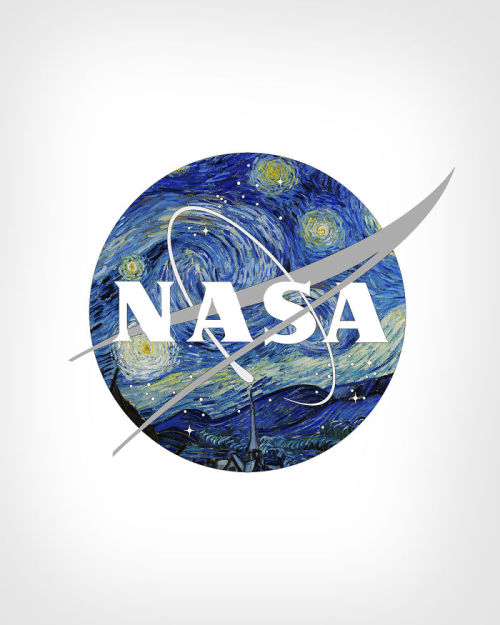
NASA’s logo reimagined with Vincent Van Gogh’s Starry Night, by Eisen Bernardo.

‘Space Station and Shuttle’ (1981) by Jack Olsen for Boeing Aerospace. From the book Visions of Space by David Hardy (1989)

“I could do so much more.”
You be careful, because your song is ending, sir. It is returning, it is returning through the dark. And then Doctor... Oh, but then... He will knock four times.
Carmen, Planet of the Dead







I WILL STOP NOW
Solar System: 2015 Year in Review

Two mysterious worlds explored for the first time. Liquid water seen flowing on Mars. A global ocean discovered hiding inside a moon of Saturn. Even during our Era of audacious solar system exploration, 2015 stands out. Here are a few highlights:
1. New Horizons Reveals the Face of Pluto

Whether or not you call it a planet, Pluto entranced the people of Earth when it sent a love note from three billion miles away via our New Horizons spacecraft.
2. Dawn Comes to Ceres

The dwarf planet Ceres, the largest object in the main asteroid belt, teased explorers with its bizarre bright spots before finally giving up some of its secrets to the Dawn spacecraft. HERE are the latest findings.
3. Cassini Marks Discoveries and Milestones at Enceladus

When the Cassini spacecraft performs its final close flyby of Saturn’s icy moon Enceladus on Dec. 19, it will be a true milestone. Scientists using data from Cassini’s instruments have uncovered astounding secrets about this small moon, including (confirmed this year) the fact that its underground ocean of liquid water is global, and is home to hydrothermal vents.
4. We Confirmed Evidence that Liquid Water Flows on Today’s Mars

Findings from our Mars Reconnaissance Orbiter (MRO) provided the strongest evidence yet that liquid water flows intermittently — on present-day Mars.
5. Rosetta Passes Perihelion

The European Space Agency’s Rosetta mission had a remarkable year, re-establishing contact with the Philae lander and following comet 67P/Churyumov-Gerasimenko as it swung near the sun.
6. Mars Explorers Confirm Lakes Once Dotted Mars

A study from the team behind our Mars Science Laboratory/Curiosity Rover confirmed that Mars was once, billions of years ago, capable of storing water in lakes over an extended period of time.
7. MAVEN Finds a Culprit in the Loss of Mars’ Atmosphere

The Mars Atmosphere and Volatile Evolution (MAVEN) mission identified the process that appears to have played a key role in the transition of the Martian climate from an early, warm and wet environment that might have supported surface life to the cold, arid planet that Mars is today.
8. Akatsuki Gets a Second Chance at Venus

Five years after a mishap sent the spacecraft off course, the Japan Aerospace Exploration Agency (JAXA) successfully inserted the Venus Climate Orbiter “Akatsuki” into orbit around Venus. While the mission is not funded by NASA, an agency partnership with JAXA provides an opportunity for eight of our scientists to work with the Akatsuki team and study data from the spacecraft over the next year or so.
9. A Trailblazing Mission Sends Its Final Message from Mercury

After a flight of nearly 11 years, the highly successful MESSENGER mission ended when, as planned, the spacecraft slammed into the surface of Mercury.
10. Mars Reconnaissance Orbiter Completes 40,000 Orbits

Mars Reconnaissance Orbiter, at Mars since 2006, has orbited the Red Planet more than 40,000 times. The mission, which studies the whole planet from space, has shown that Mars is diverse and dynamic by way of many thousands of spectacular images and other kinds of data.
Make sure to follow us on Tumblr for your regular dose of space: http://nasa.tumblr.com
Turn right, and never meet that man!
The Fortune Teller, Turn Left(2008)








Will your tongue really stick to a frozen flagpole? Yes.
(Live Science/Cinema.de)

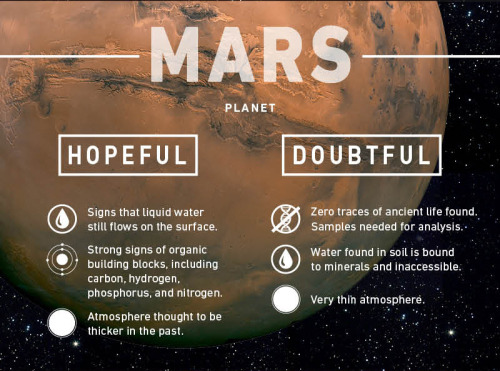
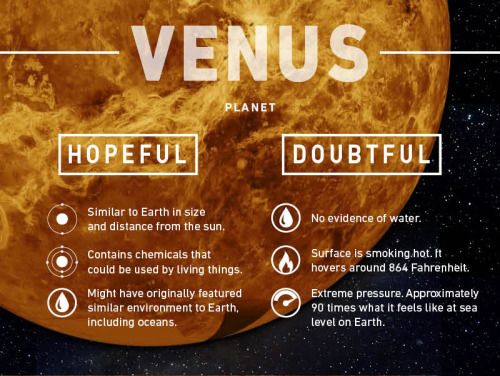
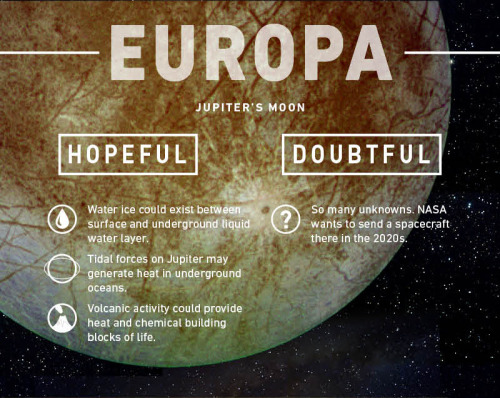
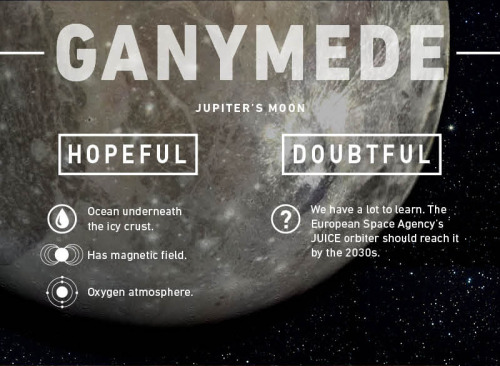



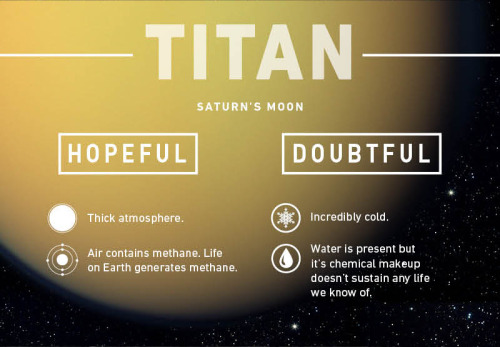
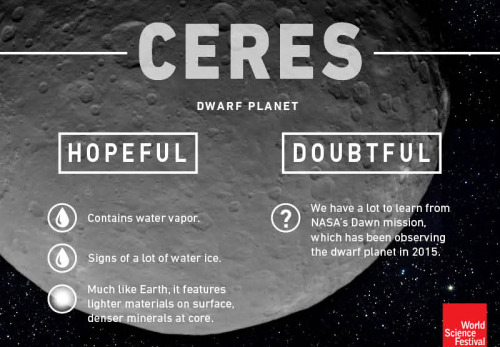
Where Could Life Exist?
When NASA scientists announced earlier this year that they had found evidence of liquid water on Mars, imaginations ran wild with the possibility that life could exist somewhere other than here on Earth.
Scientists continue to explore the possibility that Mars once looked a lot like Earth — salty oceans, fresh water lakes, and a water cycle to go with it. That’s exciting stuff.
So where else are they looking? What exactly are they looking for?
There are nine places in our universe where scientists say life is a possibility. The locations range from a smoking hot planet like Venus to a moon that orbits Saturn called Enceladus, which looks a lot like a massive, tightly-packed ball of ice.
All of these places show signs that water is, or at least was, a possibility. They also appear to feature some kind of energy that could produce heat.
full resolution

![NASA Has Released More Than 8,000 Images Of The Apollo Missions. [flickr Archive]](https://64.media.tumblr.com/cf7647bb219a067b5e94cbc26c064a60/tumblr_nvmcqrT6NK1qbuzjco8_500.jpg)
![NASA Has Released More Than 8,000 Images Of The Apollo Missions. [flickr Archive]](https://64.media.tumblr.com/c66698f2bbea9142a0de0f6341aae88e/tumblr_nvmcqrT6NK1qbuzjco7_500.jpg)
![NASA Has Released More Than 8,000 Images Of The Apollo Missions. [flickr Archive]](https://64.media.tumblr.com/7a568cc8ff23d2d46648fd2b5e41f692/tumblr_nvmcqrT6NK1qbuzjco1_500.jpg)
![NASA Has Released More Than 8,000 Images Of The Apollo Missions. [flickr Archive]](https://64.media.tumblr.com/2fb70c73872eb83201fa9e777920a56b/tumblr_nvmcqrT6NK1qbuzjco2_500.jpg)
![NASA Has Released More Than 8,000 Images Of The Apollo Missions. [flickr Archive]](https://64.media.tumblr.com/70d483fd397901bdff3d619c315ad472/tumblr_nvmcqrT6NK1qbuzjco3_500.jpg)
NASA has released more than 8,000 images of the Apollo missions. [flickr archive]
Slideshow of Venus photos from the Soviet Venera 9 orbiter, 1975

Dorothy Metcalf-Lindenburger was the first (fellow) graduate of Space Camp in Huntsville, AL to fly in space. She flew aboard Discovery on STS-131.

The inscription above the entrance to Space Camp
I'm gonna get a lot of hate for this

requested

Mosaic of Mercury images, taken from 125,000 miles away by the Mariner 10 space probe in 1974. (NASA)
Well, I'm a day late

Nineteen years since humanity lost a hero. Remembering Carl today.
Carl Sagan (November 9, 1934 - December 20, 1996)
Fascinating article, not AT ALL surprising, but fascinating all the same
Is this Ellington Field in Houston? Because I know they mounted Space Shuttle Independence (NOT the one from Micheal Bay’s Armageddon) onto Shuttle Carrier Aircraft 905 a few years back after they moved Explorer (NOT the one from Alfonso Cuaron’s Gravity) to Houston and rechristened it with the name we all know today. Or this might just be one of the SCAs when they were very much in operation. This is still a cool picture.

One hell of a parking lot.
I agree, Bernadette! But seriously, YOU DON’T GIVE AWAY A MAN’S TARDIS!

The Big Bang Theory Merchandise: http://bit.ly/1aAdDNX
NOICE!

Visit Gallifrey by Alecxps is $11 for a limited time at OtherTees
When some fangirl says that Frozen is the best movie ever...

Dalek, Doctor Who, Watercolor Art Print

-__________-
‘Doctor Who’ series 1-9 in chronological order

In his defense, he didn’t know if it was the real life or just fantasy...

